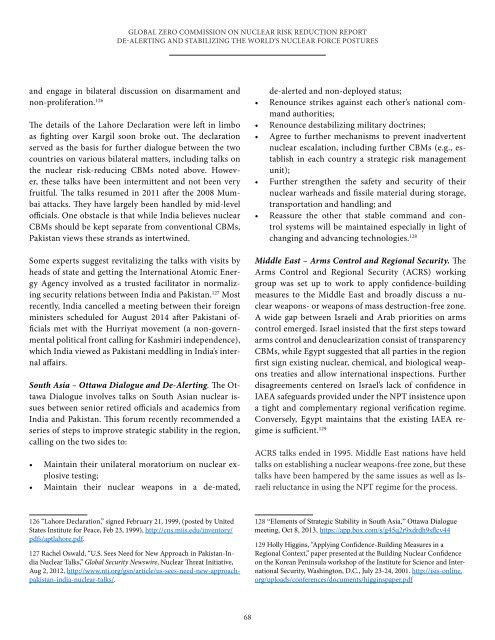global_zero_commission_on_nuclear_risk_reduction_report
global_zero_commission_on_nuclear_risk_reduction_report
global_zero_commission_on_nuclear_risk_reduction_report
You also want an ePaper? Increase the reach of your titles
YUMPU automatically turns print PDFs into web optimized ePapers that Google loves.
GLOBAL ZERO COMMISSION ON NUCLEAR RISK REDUCTION REPORTDE-ALERTING AND STABILIZING THE WORLD’S NUCLEAR FORCE POSTURESand engage in bilateral discussi<strong>on</strong> <strong>on</strong> disarmament andn<strong>on</strong>-proliferati<strong>on</strong>. 126The details of the Lahore Declarati<strong>on</strong> were left in limboas fighting over Kargil so<strong>on</strong> broke out. The declarati<strong>on</strong>served as the basis for further dialogue between the twocountries <strong>on</strong> various bilateral matters, including talks <strong>on</strong>the <strong>nuclear</strong> <strong>risk</strong>-reducing CBMs noted above. However,these talks have been intermittent and not been veryfruitful. The talks resumed in 2011 after the 2008 Mumbaiattacks. They have largely been handled by mid-levelofficials. One obstacle is that while India believes <strong>nuclear</strong>CBMs should be kept separate from c<strong>on</strong>venti<strong>on</strong>al CBMs,Pakistan views these strands as intertwined.Some experts suggest revitalizing the talks with visits byheads of state and getting the Internati<strong>on</strong>al Atomic EnergyAgency involved as a trusted facilitator in normalizingsecurity relati<strong>on</strong>s between India and Pakistan. 127 Mostrecently, India cancelled a meeting between their foreignministers scheduled for August 2014 after Pakistani officialsmet with the Hurriyat movement (a n<strong>on</strong>-governmentalpolitical fr<strong>on</strong>t calling for Kashmiri independence),which India viewed as Pakistani meddling in India’s internalaffairs.South Asia – Ottawa Dialogue and De-Alerting. The OttawaDialogue involves talks <strong>on</strong> South Asian <strong>nuclear</strong> issuesbetween senior retired officials and academics fromIndia and Pakistan. This forum recently recommended aseries of steps to improve strategic stability in the regi<strong>on</strong>,calling <strong>on</strong> the two sides to:• Maintain their unilateral moratorium <strong>on</strong> <strong>nuclear</strong> explosivetesting;• Maintain their <strong>nuclear</strong> weap<strong>on</strong>s in a de-mated,de-alerted and n<strong>on</strong>-deployed status;• Renounce strikes against each other’s nati<strong>on</strong>al commandauthorities;• Renounce destabilizing military doctrines;• Agree to further mechanisms to prevent inadvertent<strong>nuclear</strong> escalati<strong>on</strong>, including further CBMs (e.g., establishin each country a strategic <strong>risk</strong> managementunit);• Further strengthen the safety and security of their<strong>nuclear</strong> warheads and fissile material during storage,transportati<strong>on</strong> and handling; and• Reassure the other that stable command and c<strong>on</strong>trolsystems will be maintained especially in light ofchanging and advancing technologies. 128Middle East – Arms C<strong>on</strong>trol and Regi<strong>on</strong>al Security. TheArms C<strong>on</strong>trol and Regi<strong>on</strong>al Security (ACRS) workinggroup was set up to work to apply c<strong>on</strong>fidence-buildingmeasures to the Middle East and broadly discuss a <strong>nuclear</strong>weap<strong>on</strong>s- or weap<strong>on</strong>s of mass destructi<strong>on</strong>-free z<strong>on</strong>e.A wide gap between Israeli and Arab priorities <strong>on</strong> armsc<strong>on</strong>trol emerged. Israel insisted that the first steps towardarms c<strong>on</strong>trol and de<strong>nuclear</strong>izati<strong>on</strong> c<strong>on</strong>sist of transparencyCBMs, while Egypt suggested that all parties in the regi<strong>on</strong>first sign existing <strong>nuclear</strong>, chemical, and biological weap<strong>on</strong>streaties and allow internati<strong>on</strong>al inspecti<strong>on</strong>s. Furtherdisagreements centered <strong>on</strong> Israel’s lack of c<strong>on</strong>fidence inIAEA safeguards provided under the NPT insistence up<strong>on</strong>a tight and complementary regi<strong>on</strong>al verificati<strong>on</strong> regime.C<strong>on</strong>versely, Egypt maintains that the existing IAEA regimeis sufficient. 129ACRS talks ended in 1995. Middle East nati<strong>on</strong>s have heldtalks <strong>on</strong> establishing a <strong>nuclear</strong> weap<strong>on</strong>s-free z<strong>on</strong>e, but thesetalks have been hampered by the same issues as well as Israelireluctance in using the NPT regime for the process.126 “Lahore Declarati<strong>on</strong>,” signed February 21, 1999, (posted by UnitedStates Institute for Peace, Feb 23, 1999), http://cns.miis.edu/inventory/pdfs/aptlahore.pdf.127 Rachel Oswald, “U.S. Sees Need for New Approach in Pakistan-IndiaNuclear Talks,” Global Security Newswire, Nuclear Threat Initiative,Aug 2, 2012, http://www.nti.org/gsn/article/us-sees-need-new-approachpakistan-india-<strong>nuclear</strong>-talks/.128 “Elements of Strategic Stability in South Asia,” Ottawa Dialoguemeeting, Oct 8, 2013, https://app.box.com/s/g45q2r9xdrdh9sflcv44129 Holly Higgins, “Applying C<strong>on</strong>fidence-Building Measures in aRegi<strong>on</strong>al C<strong>on</strong>text,” paper presented at the Building Nuclear C<strong>on</strong>fidence<strong>on</strong> the Korean Peninsula workshop of the Institute for Science and Internati<strong>on</strong>alSecurity, Washingt<strong>on</strong>, D.C., July 23-24, 2001. http://isis-<strong>on</strong>line.org/uploads/c<strong>on</strong>ferences/documents/higginspaper.pdf68


